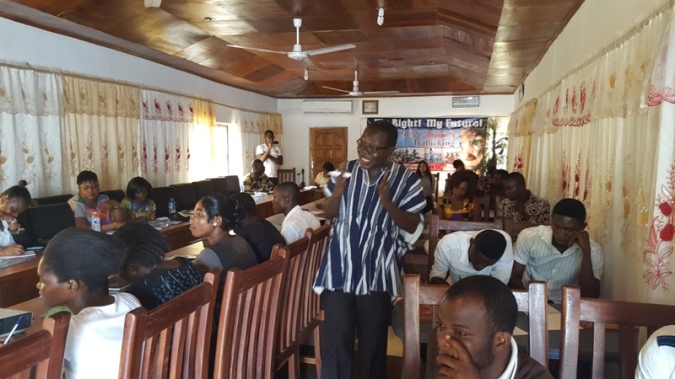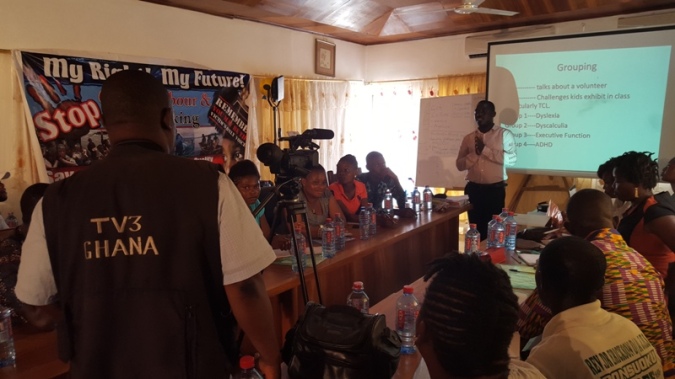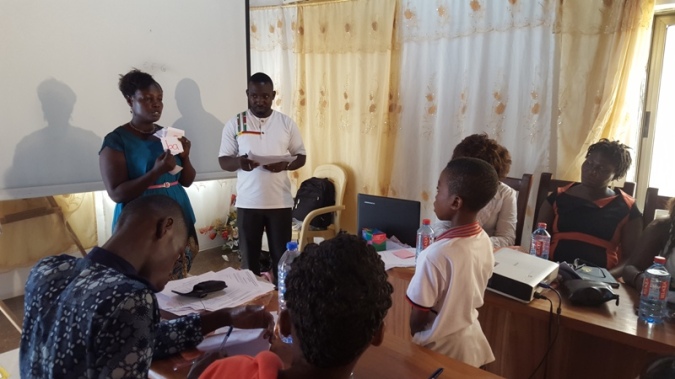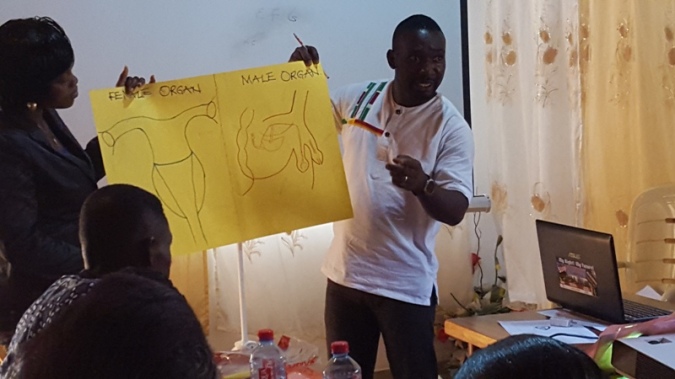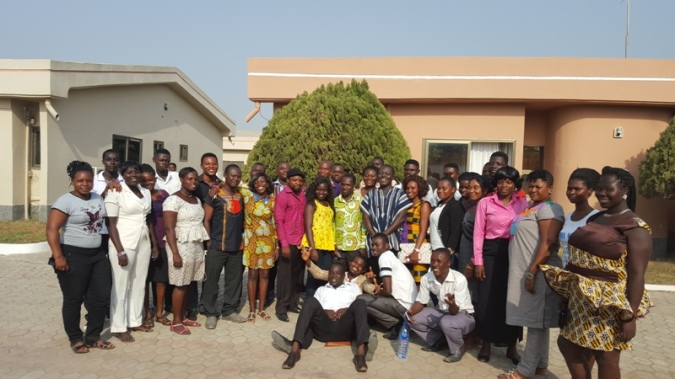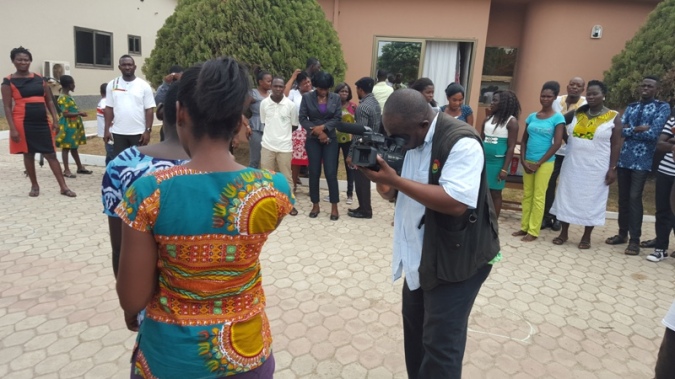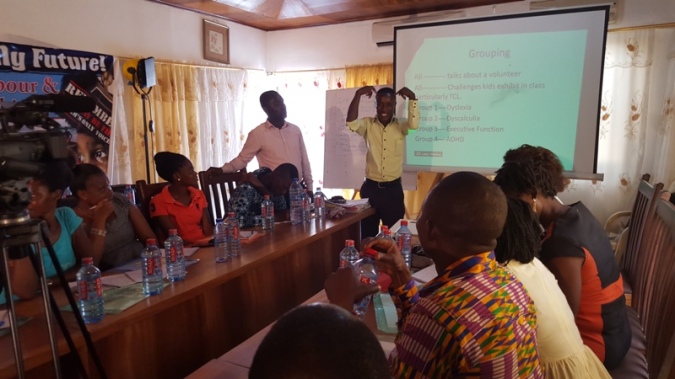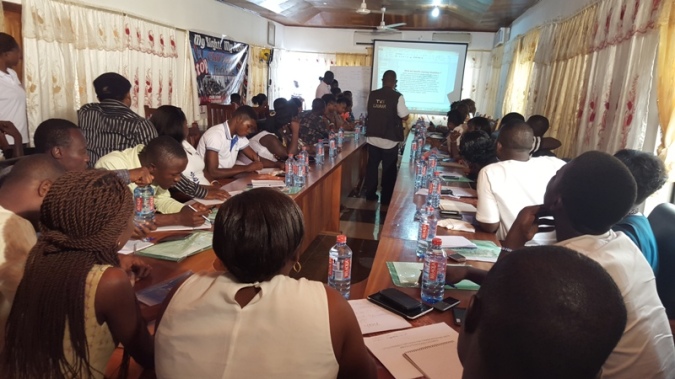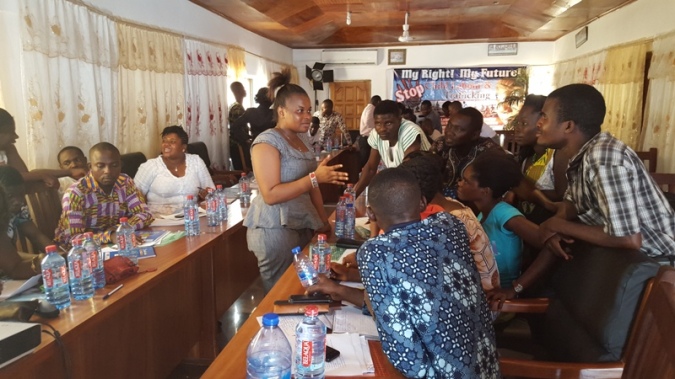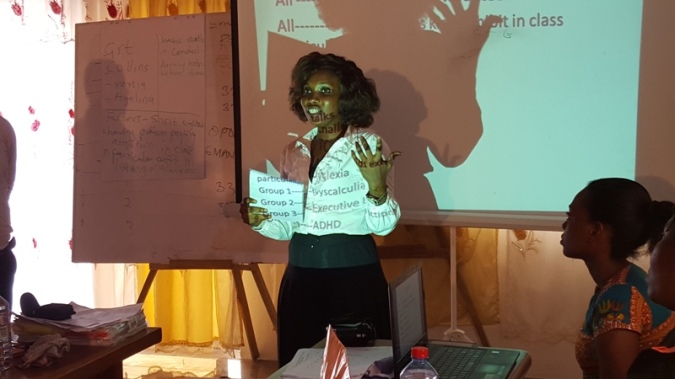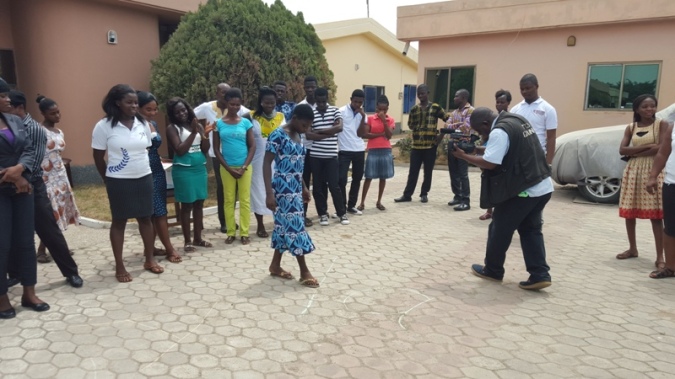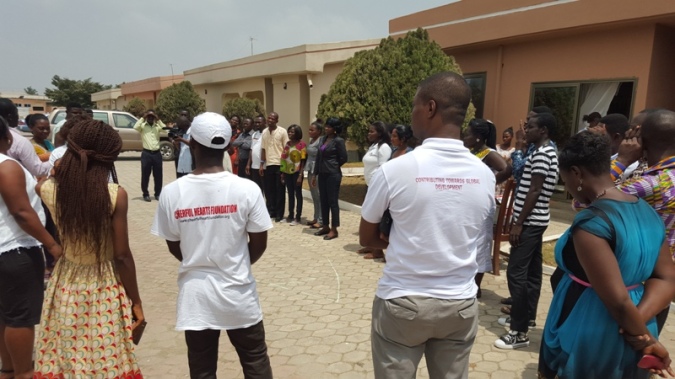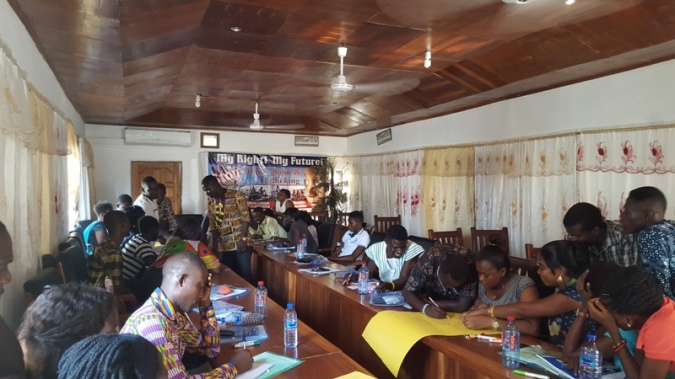 My Right My Future Project
My Right My Future Project
The My Right My Future project is a partnership project between the Cheerful Hearts Foundation and Child Rights Ambassadors Denmark which is aimed at increasing awareness and advocacy on the dangers of child labour & trafficking, importance of education and children’s rights. The goal of the 2 year project funded by the Danish Youth Council (DUF) is that 400 more children would be enrolled in school through increased educational campaigns and awareness and various interventions.
TRAININGS AND ITS IMPORTANCE
Psychological Trauma
On the first day of training Mr. Adolf Awuku Bekoe, Clinical Psychologist and National Coordinator of the Coalition on Domestic Violence Legislation in Ghana (DV Coalition) and a lecturer in psychology at the Methodist University College Ghana served as the resource person for the topic. Creating a very interesting and participatory learning environment, Mr. Awuku Bekoe helped participants to deepen their knowledge and appreciate the various stages in brain development and how crucial early childhood experiences can positively or negatively affect the brain of the child and their future. Participants were happy to know that stress experienced by most child labourers and trafficked children produces more chemical called Cortisol which can slow brain development; and child may experience more cognitive, motor and social delays. However, it was important for teachers to know that the two basic needs for brain development are safety and positive experiences.
A Safe Environment for Brain Development
- Reduce stress by making child’s world safe, secure and responsive.
- Remove any physical threats.
- Responsive to crying.
- Predictable daily routines.
- Adequate nutrition & hydration
- Loving care & touch
- Consistent, individual attention
- Every day, simple activities
- Exposure to new experiences
Mr. Awuku Bekoe after using his personal life experiences, schooled participants through practical Child-friendly methods for communicating with Abused/trafficked children.
Learning Disabilities & Its Management
Mr. Padmore Quansah, Executive Director of Campaign for Learning Disabilities Ghana (CLED) and Mr. Eric Kpegah, Special Education Officer of the Ghana Education Service, Awutu Senya West District served as the resource persons for this session. The experts trained participants on the various learning disabilities that child labourer’s and trafficked children are likely to experience or face.
Some Common Specific Learning Disabilities are:
Dyslexia: Difficulty in reading, writing and spelling
Dyscalculia: Difficulty in mathematics
Dysgraphia: Difficulty in writing
Dyspraxia: Difficulty in movement and coordination (‘clumsiness’)
Irlen Syndrome: Difficulty in how the brain interprets printed material
Autism: Difficulty in relating and communicating with other people
Executive Function: Difficulty with organization and time management
Attention Deficit (Hyperactivity) Disorder: Inability to concentrate, pay attention and control behavior well.
To ensure the practicality of how the above learning disabilities can be managed or supported by the participants, four children with learning disabilities from one of the fishing communities attended the training and were used as case study. The participant’s were put into four groups with each of them having one of the children, identified the learning disabilities with the particular child assigned and made a presentation of their findings. After that, participants used the various management tools (new approach) to help the students identify, spell or correct the things they were unable to do previously.
This experience was indeed very insightful and practical which would help the teachers to effectively manage the various learning disabilities faced by various trafficked children in their schools.
Participants (teachers) were also enlightened about the inclusion rights of the Ghana Education Service and various UN Conventions on the Rights of the Child , to help them appreciate why the need to support and protect the rights of these vulnerable children.
Padmore Quansah, Director of CLED takes participants through various Learning disabilities and its management
Its simply amazing how these learning difficulties can be corrected easily using the right leaning approach by participants
Sexual and Reproductive Health & Rights (SRHR)
Teenage pregnancy is one major contributing factor to the number of children who are trafficked from the Senya community. Through an ongoing research being conducted by the Cheerful Hearts Foundation (CHF), most teenage mothersare unable to provide educational support and three square meals for their children due to irresponsible fatherhood and poverty. This makes it so easy for children born by these teenagers more vulnerable to be sold out to traffickers in exchange for a few Ghanaian Cedis. Additionally, the school drop-out rate and poor attendance by young girls in primary and junior high schools within the community has really increased said Director of Education, Awutu Senya West District. It has become therefore very necessary to deepen teachers understanding on SRHR so that they can serve as health promoters and counselors for their various schools. Participants on their return to their various schools would hold separate counseling sessions for their students (boys and girls) and create a friendly atmosphere to ensure that students can feel comfortable to confide in them and to share their problems and receive support from the teachers.
Mr. Andrew Owusu, Medical Assistant (Chief) of the Ghana Health Service, Senya and Madam Gifty Brebo, SHEP Coordinator of Ghana Education Service, Awutu Senya West District facilitated this session. The Cheerful Hearts Foundation in collaboration with the Ghana Education Service, Awutu Senya West has a monitoring plan to ensure that knowledge gained by participants is used to serve the targeted population.
Leadership/ Philanthropy and Volunteering
On the final day of training, Mr. Eric Opoku Agyemang, Executive Director of the Cheerful Hearts Foundation and Alumni of the President Obama’s Young African Leaders Initiative (YALI Accra RLC 2015) shared personal experiences on leadership/volunteering and how it has benefited his life. Engaging participants in some reflections on how their individual actions could help make a great impact in society, participants were ready to make the necessary change they want to see and also be the voice of the children who are trafficked from the Senya fishing communities.
Feedback/comments / recommendations from Participants:
How important is this training to you?
- The training was very important because I can now relate better and understand each child in my class and school. I will now pay much attention to the pupils who have difficulties in their learning.
- The training will enhance my teaching and will help me handle trafficked children better than before.
- I have gained a lot of knowledge on certain issues that I was not familiar and informed about. I will say it will help handle and help trafficked and child labourers in my school and community as a whole and tolerate their behaviour.
- This training has helped a lot and has changed my perception about children. The training was educative and informative
- Through the training I have gained more understanding of how to handle trafficked children and also how to help them know their rights.
- This training has been helpful and I would use what I have acquired to solve my daughter’s hyperactive problem. I have learnt through this training not to insult any pupil. I have been encouraged to keep up with the good work am already doing.
- The training was informative, educative and entertaining .it gave me the knowledge and skill on how I can handle and care for children with disabilities, child labourers and trafficked child
- The training was educative. Through this training I will be able to handle children with special needs. I also learnt the effects of child trafficking. I will also help fight against child trafficking
- This training has been helpful because it will help me have a well planned lesson notes
Any recommendation/comments you have for Cheerful Heart Foundation etc?
- This workshop should be organized again and more teachers should be given the chance to attend and gain insight of how to handle children who have been trafficked and child labourers.
- Such programs should be organized regularly
- Cheerful Heart Foundation should keep up with the good job and be the voice of these children.
- I recommend that they hold this training every three months so we learn more on how to handle children with disabilities and low IQ
- Details of the topic should be included to letters sent to schools. Communication of time should be worked on.
- More of such programmes should be organized and follow ups done to ensure participants are putting in use skills acquired through the training.
Cheerful Hearts Foundation team would like to thank TV3 for recording this event and helping spread the advocacy against child labour & trafficking in Ghana.
Reported by:
Eric Opoku Agyemang
Executive Director
Cheerful Hearts Foundation
Additional Pictures from the event
Participants discuss on the various learning disabilities common with trafficked children and how to manage them
A former child labourer with spelling and alphabet identification problem has improved after 2 hours of new teaching approach


